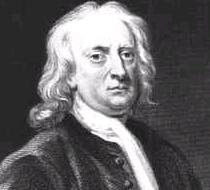Newton, Sir Isaac
.
 Newton, Sir Isaac (1642-1727), English physicist, mathematician, and natural philosopher, considered one of the most important scientists of all time. Newton formulated laws of universal gravitation and motion—laws that explain how objects move on Earth as well as through the heavens (see Mechanics). He established the modern study of optics—or the behavior of light—and built the first reflecting telescope. His mathematical insights led him to invent the area of mathematics called calculus (which German mathematician Gottfried Wilhelm Leibniz also developed independently). Newton stated his ideas in several published works, two of which, Philosophiae Naturalis Principia Mathematica (Mathematical Principles of Natural Philosophy, 1687) and Opticks (1704), are considered among the greatest scientific works ever produced. Newton’s revolutionary contributions explained the workings of a large part of the physical world in mathematical terms, and they suggested that science may provide explanations for other phenomena as well.
Newton, Sir Isaac (1642-1727), English physicist, mathematician, and natural philosopher, considered one of the most important scientists of all time. Newton formulated laws of universal gravitation and motion—laws that explain how objects move on Earth as well as through the heavens (see Mechanics). He established the modern study of optics—or the behavior of light—and built the first reflecting telescope. His mathematical insights led him to invent the area of mathematics called calculus (which German mathematician Gottfried Wilhelm Leibniz also developed independently). Newton stated his ideas in several published works, two of which, Philosophiae Naturalis Principia Mathematica (Mathematical Principles of Natural Philosophy, 1687) and Opticks (1704), are considered among the greatest scientific works ever produced. Newton’s revolutionary contributions explained the workings of a large part of the physical world in mathematical terms, and they suggested that science may provide explanations for other phenomena as well.
 Newton, Sir Isaac (1642-1727), English physicist, mathematician, and natural philosopher, considered one of the most important scientists of all time. Newton formulated laws of universal gravitation and motion—laws that explain how objects move on Earth as well as through the heavens (see Mechanics). He established the modern study of optics—or the behavior of light—and built the first reflecting telescope. His mathematical insights led him to invent the area of mathematics called calculus (which German mathematician Gottfried Wilhelm Leibniz also developed independently). Newton stated his ideas in several published works, two of which, Philosophiae Naturalis Principia Mathematica (Mathematical Principles of Natural Philosophy, 1687) and Opticks (1704), are considered among the greatest scientific works ever produced. Newton’s revolutionary contributions explained the workings of a large part of the physical world in mathematical terms, and they suggested that science may provide explanations for other phenomena as well.
Newton, Sir Isaac (1642-1727), English physicist, mathematician, and natural philosopher, considered one of the most important scientists of all time. Newton formulated laws of universal gravitation and motion—laws that explain how objects move on Earth as well as through the heavens (see Mechanics). He established the modern study of optics—or the behavior of light—and built the first reflecting telescope. His mathematical insights led him to invent the area of mathematics called calculus (which German mathematician Gottfried Wilhelm Leibniz also developed independently). Newton stated his ideas in several published works, two of which, Philosophiae Naturalis Principia Mathematica (Mathematical Principles of Natural Philosophy, 1687) and Opticks (1704), are considered among the greatest scientific works ever produced. Newton’s revolutionary contributions explained the workings of a large part of the physical world in mathematical terms, and they suggested that science may provide explanations for other phenomena as well. 
Comments